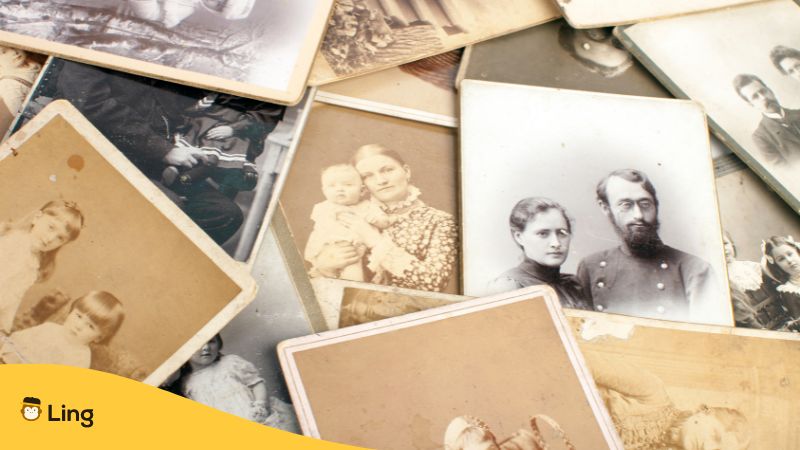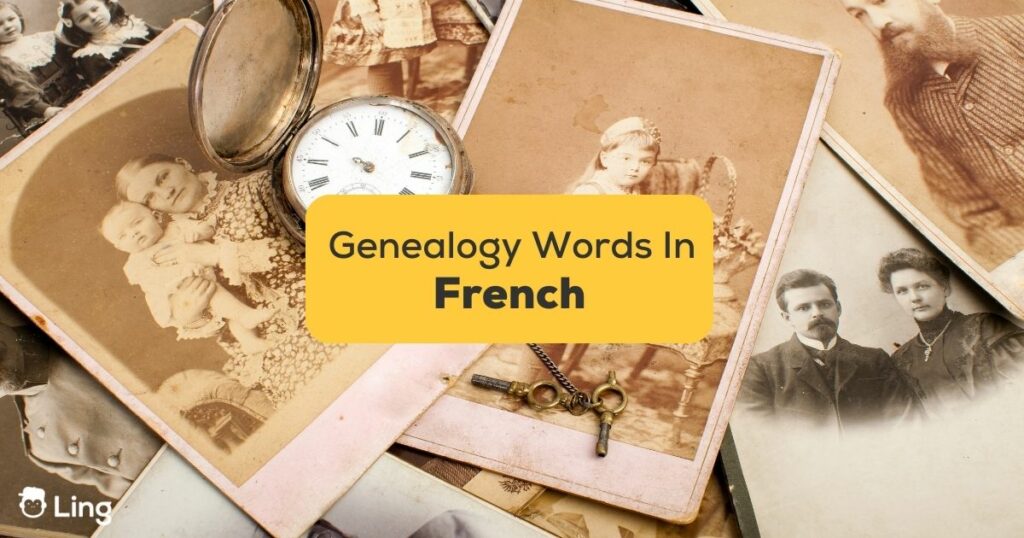How many times have you daydreamed about unearthing a secret family fortune or peering back through the generations to find that you’re related to Marie Antoinette, Napoleon, or – gasp – even Mick Jagger? We’ve all been there. In this post, we’ll talk about the French genealogy words you’ll ever need to know! Trust us – you’ll have so much fun as we decode the charming words and phrases that open locked doors to ancestral mysteries. Let’s begin!
Understanding The Importance Of French Genealogy
Let’s pop into our metaphorical time machine and pose a question: “Why should anyone spend their Sunday afternoons leafing through public documents or scrolling through digitized records, all in a language that sounds like an Edith Piaf song?” Or better yet, why would anyone want to decipher words like ‘Décès’ or ‘Naissance’ when they could be basking in the glow of the latest Netflix hit? We’re glad you asked!
The thing is, your genes have journeyed through time and space even to reach you. Understanding French genealogy is like finally meeting an old friend at a nostalgic street corner, shaking hands, and whispering, “So, this is where we came from.”
French genealogy is not just about indulgence in past life fantasy or finding a connection to a high-profile French character, oh no! It’s about reaching out to your story, the narrative that shapes you and gives you a unique place on the planet. Essentially, it’s a quest to find yourself.
Its significance is twofold. First, it could help connect the dots tracing back to your French ancestors. There’s something undeniably thrilling about piecing together your personal history, thread by delicate thread. Perhaps there’s a French royal in your family tree, or a brave Revolution-era freedom fighter. Or maybe your ancestors were simple bakers who made bread for the likes of Napoleon Bonaparte!
Secondly, understanding these French genealogical terms helps break down language barriers when diving into primary sources. No doubt, this makes the process less of a weary slog and more of a rapid waltz down memory lane.
So, fellow history buffs, why not leap into this time capsule and excavate forgotten family lore?
French Genealogy Words
Just as a seasoned chef wouldn’t attempt to prepare Coq au Vin without first understanding his ingredients, a beginner genealogist needs to grasp the basic terminologies in their quest to decode the past. Let’s transform you from an intrigued novice to an informed explorer with some important terms:

Généalogie
Simply meaning ‘genealogy,’ this is the framework on which your family history hangs. It’s the study of families, family history, and the tracing of their lineages. Généalogie is your password into the fantastic world of French family history.
- “Ma généalogie remonte jusqu’au règne de Henri IV.”
Translation: “My genealogy goes back to the reign of Henry IV.” - “La généalogie est plus qu’un hobby, c’est une véritable passion pour moi.”
Translation: “For me, genealogy is more than a hobby; it’s a real passion.” - “Je vais prendre un cours de généalogie pour en savoir plus sur mon héritage familial.”
Translation: “I’m going to take a genealogy course to learn more about my family heritage.”
Arbre Généalogique
This elegant phrase refers to your ‘family tree’ – the diagram showcasing your family relationships in a conventional tree structure. The “Généalogique” part is a major clue, but remember, no tree or biological growth is actually involved.
- “Mon arbre généalogique a révélé que mon arrière-grand-père était poète.”
Translation: “My family tree revealed that my great-grandfather was a poet.” - “Je vais créer un arbre généalogique en ligne pour mieux comprendre mes racines.”
Translation: “I’m going to create an online family tree to better understand my roots.” - “Mon arbre généalogique s’étend sur six générations.”
Translation: “My family tree spans across six generations.”

Ancêtre
These are your ‘ancestors.’ An “Ancêtre” may include your grandparents, great-grandparents, and even further back — each one adding a new layer of flavor to your genealogical bouillabaisse.
- “Napoléon Bonaparte est un ancêtre lointain du côté de ma mère.”
Translation: “Napoleon Bonaparte is a distant ancestor on my mother’s side.” - “La maison que nous habitons a été construite par un de nos ancêtres.”
Translation: “The house we live in was built by one of our ancestors.” - “Mon ancêtre était un explorateur célèbre durant l’époque de la colonisation.”
Translation: “My ancestor was a famous explorer during the colonization era.”
Décès
This word identifies a ‘death’. A note – when you spot this term in records, it’s usually referring to the end of someone’s life Journey. It allows us to honor those who came before us and tell their tales, even when they’re no longer around to tell them themselves.
- “Le décès de mon arrière-grand-mère a été documenté dans un vieux registre d’église.”
Translation: “My great-grandmother’s death was documented in an old church register.” - “Malheureusement, le décès de mon ancêtre a été causé par une épidémie de peste.”
Translation: “Unfortunately, my ancestor’s death was caused by a plague outbreak.” - “Les dates de décès peuvent aider à reconstituer l’histoire d’une famille.”
Translation: “Death dates can help piece together a family’s history.”
Mariage
On a happier note, this term signifies a ‘marriage’. It’s like the love child of ‘romance’ and ‘alliances,’ hinting at the unions that have shaped the course of your family.
- “Dans l’acte de mariage de mes grands-parents, il est écrit qu’ils se sont mariés en 1930.”
Translation: “In my grandparents’ marriage record, it is written that they married in 1930.” - “Le contrat de mariage de mes ancêtres révèle qu’ils étaient très riches.”
Translation: “My ancestors’ marriage contract reveals that they were very wealthy.” - “La date de mariage de mes parents est le 22 juin 1975.”
Translation: “My parents’ marriage date is June 22, 1975.”

Naissance
This means ‘birth’ and is likely the first record an ancestor leaves behind. Each “Naissance” in your family tree is the start of a new story, a new chapter in your genealogy book.
- “L’acte de naissance de mon père indique qu’il est né à Marseille.”
Translation: “My father’s birth record indicates he was born in Marseille.” - “Selon le registre de naissance, ma tante est née le 8 mai en 1936.”
Translation: “According to the birth register, my aunt was born on May 8 in 1936.” - “La date de naissance est le point de départ de l’histoire de chaque individu.”
Translation: “The date of birth is the starting point in the story of every individual.”
Fils / Fille
These words refer to ‘son’ and ‘daughter,’ respectively. They help us to keep track of the lineage, from one generation to the next, predicting whose footsteps we might be following without even knowing it.
- “Mon fils aîné s’appelle Jean et ma fille cadette s’appelle Marie.”
Translation: “My eldest son is named Jean, and my youngest daughter is named Marie.” - “Dans le registre paroissial, il est noté que mon fils est né en 2010 et ma fille en 2008.”
Translation: “In the parish register, it is noted that my son was born in 2010 and my daughter in 2008.” - “Les archives familiales indiquent que mon arrière-grand-père avait deux fils et trois filled.”
Translation: “Family archives indicate that my great-grandfather had two sons and three daughters.”
Époux / Épouse
These are the French terms for ‘husband’ and ‘wife’. It is found commonly in marriage records, hinting at bygone days of romance, shared dreams, and joined definitions of ‘home.’
- “Mon époux et moi avons le même anniversaire.”
Translation: “My husband and I share the same birthday.” - “L’acte de mariage indique que mon épouse est née à Lille.”
Translation: “The marriage record indicates that my wife was born in Lille.” - “Dans l’ancien registre, il est écrit que mon époux était un tailleur et que mon épouse était une couturière.”
Translation: “In the old register, it is written that my husband was a tailor and my wife was a seamstress.”
French Family Vocabulary
| English | French Translation |
|---|---|
| mother | mère |
| father | père |
| sister | sœur |
| brother | frère |
| daughter | fille |
| son | fils |
| grandmother | grand-mère |
| grandfather | grand-père |
| granddaughter | petite-fille |
| grandson | petit-fils |
| aunt | tante |
| uncle | oncle |
| niece | nièce |
| nephew | neveu |
| cousin (female) | cousine |
| cousin (male) | cousin |
| wife | femme |
| husband | mari |
| mother-in-law | belle-mère |
| father-in-law | beau-père |
| sister-in-law | belle-sœur |
| brother-in-law | beau-frère |
Learn French Words With Ling
Learning French with Ling is tailored to your personal progress, a steady journey rather than an intimidating leap. It’s like strolling through Paris at your own pace, feasting on croissants, and discovering hidden cobblestone streets one at a time.
So fellow language traveler, why wait? Harness your inner Jeanne d’Arc or Victor Hugo, and embark on your francophone journey. All you need to do is:
- Grab your smartphone or tablet
- Head over to the App Store or Google Play Store
- Search for ‘Ling,’ and voilà, your adventure in French begins!
Rest assured, your coveted key to the gateway of French — be it whipping up a Coq au Vin recipe, unraveling the secrets of your family tree, or simply ordering a café au lait like a local — is just an app download away. With the Ling app, French is no longer foreign, but only a fun, friendly challenge. So, are you ready to say, J’accepte le défi? (I accept the challenge)


































































